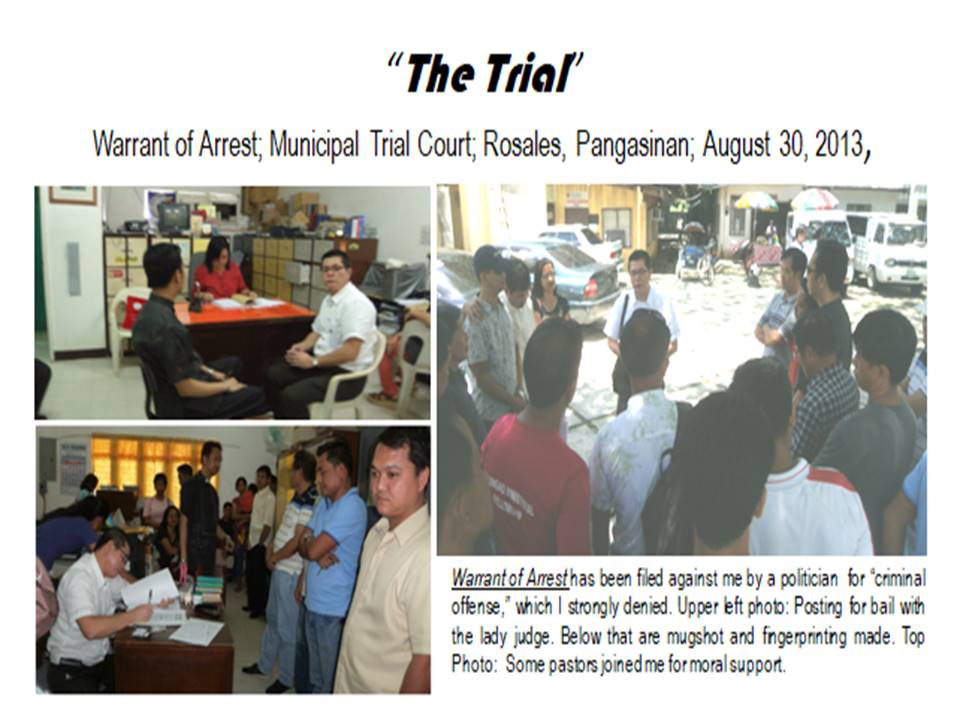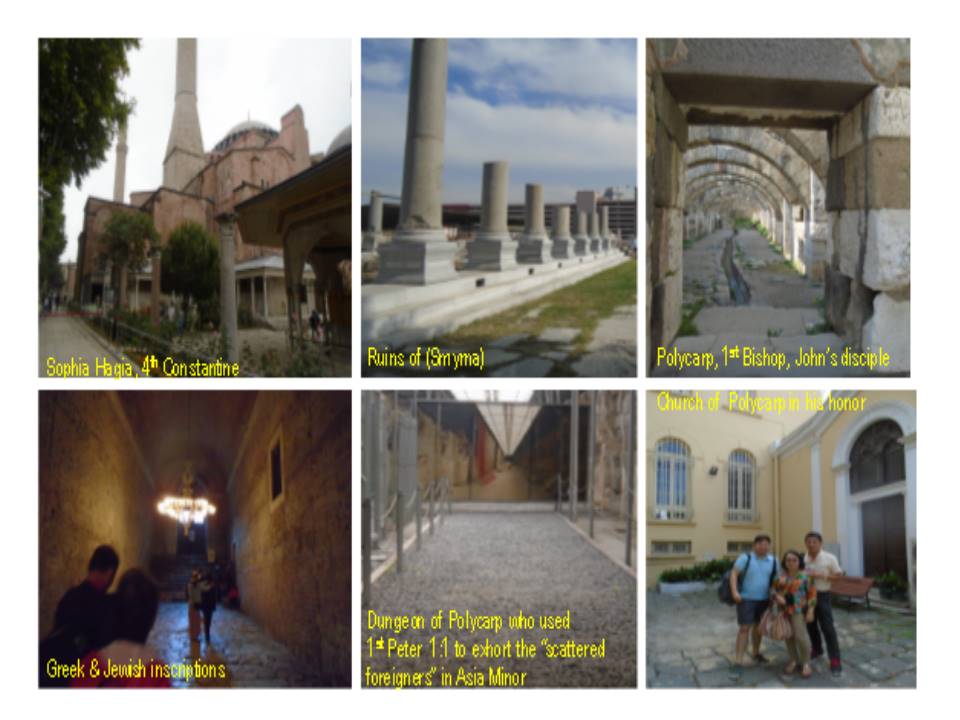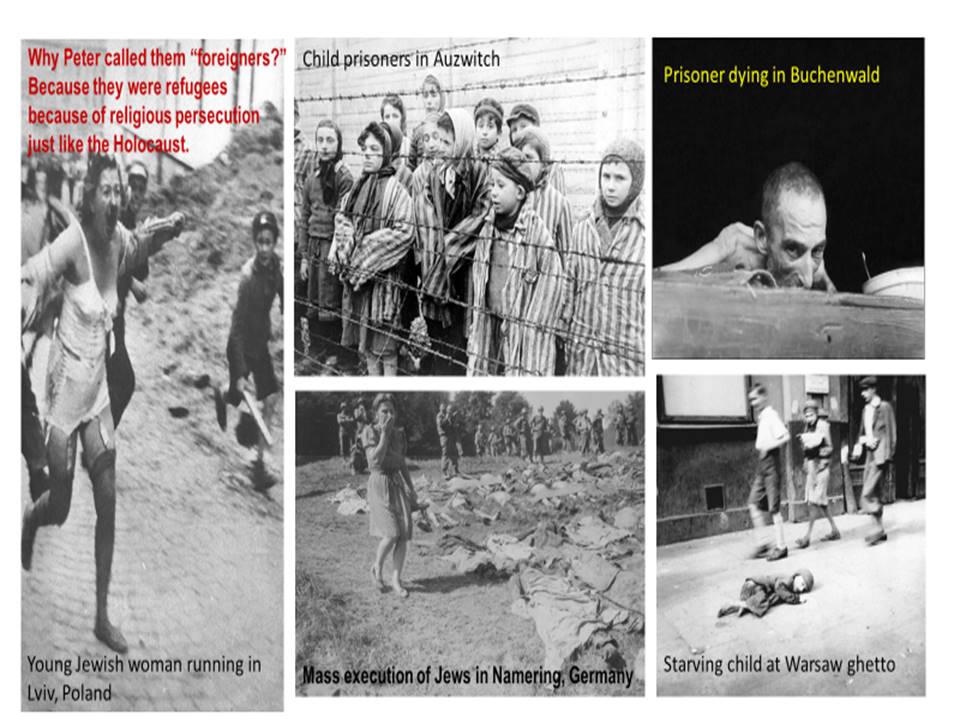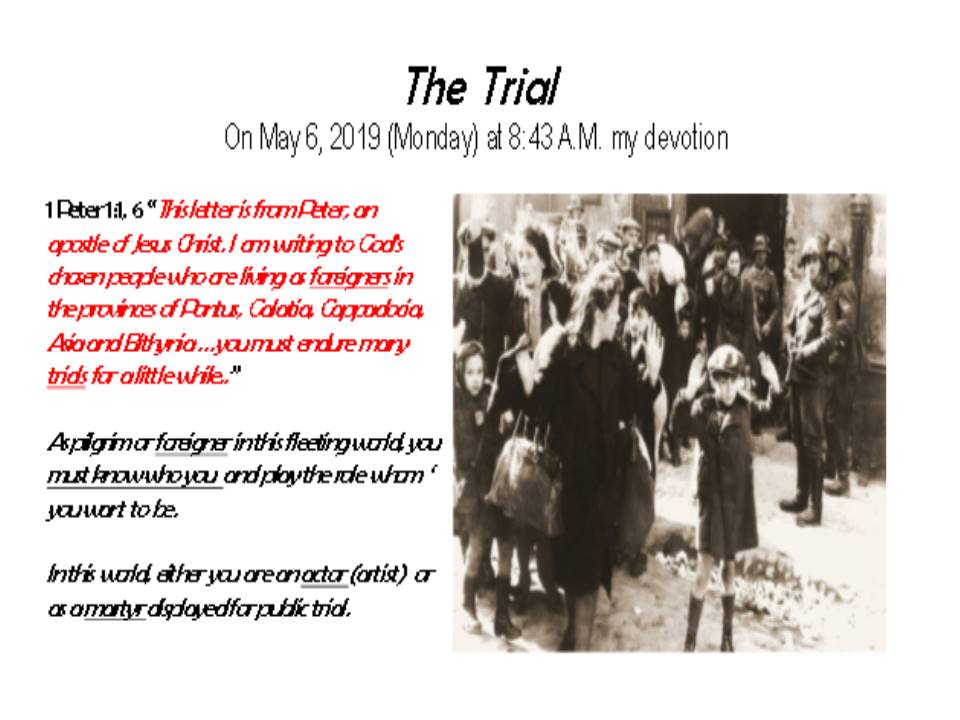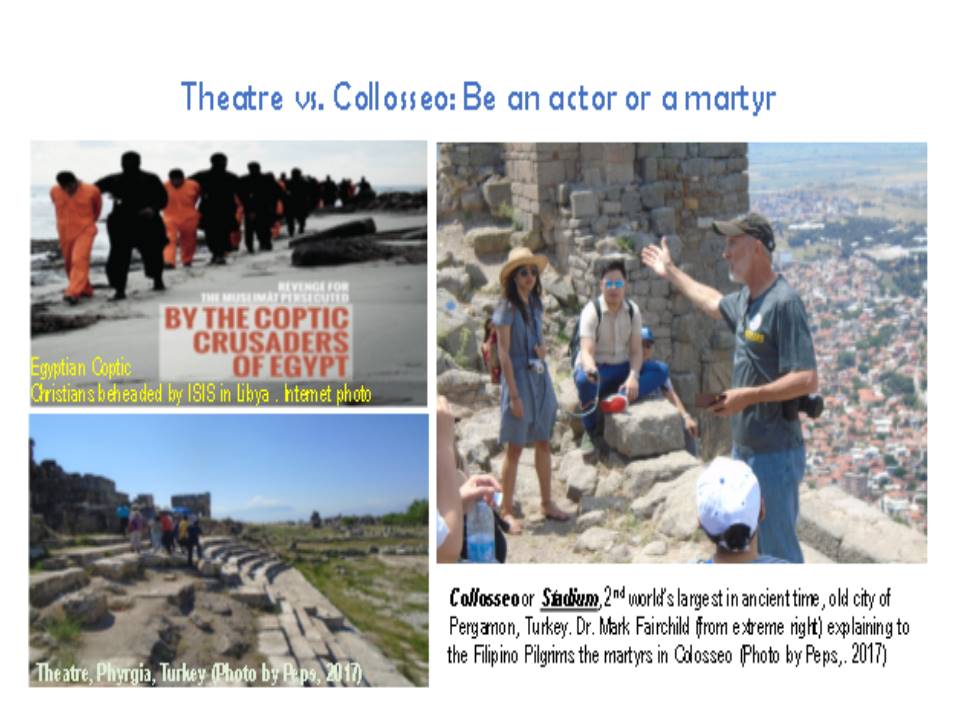The Trial
- Details
- Category: Teachings & Articles
- Published: Saturday, 11 May 2019 10:46
- Hits: 2014
By Augusto A. Kho
Month Staff Devotion
May 6, 2019 (Monday); 4:00 PM
Rewritten: May 10, 2019 (Friday); Pancake; SM-Sucat; Paranaque, 2:58 PM
It is one of the most humiliating moment that could happened to anyone, when someone
makes you a spectacle, putting you on public display for (court) trial – Peps A. Kho
(picture1)
When the Clerk of Court makes mentioned of the accused that says, “Pastor Augusto A. Kho under Criminal Case Number ______.for a crime of ______” I felt that my whole being have been already exposed for public humiliation and condemnation.
Just imagine Apostle Paul when he was brought before Caesar (Acts 27:24) as well he stood to be “cross-examined” before the court of King Agrippa (Acts 25:26/ ISV)?
“Foreigners” according to Peter
Saturday, May 4, 2019 at 4:10 A.M. I read this in 1stPeter 1:1 / NLT that says, “This letter is from Peter, an apostle of Jesus Christ.I am writing to God’s chosen people who are living as foreigners in the provinces of Pontus, Galatia, Cappadocia, Asia, and Bithynia.”
“Trials” according to Peter
On May 6, 2019 (Monday) at 8:43 A.M. my devotion reads this way, So be truly glad. There is wonderful joy ahead, even though you must endure many trials for a little while. 7 These trials will show that your faith is genuine. It is being tested as fire tests and purifies gold—though your faith is far more precious than mere gold. So when your faith remains strong through many trials, it will bring you much praise and glory and honor on the day when Jesus Christ is revealed to the whole world,” (1 Peter 1:6-7/ NLT).
These two words: foreigners and trials are inter-related.
History 1st Epistle of Peter
“The author identifies himself as the apostle Peter (1:1), and the contents and character of the letter support his authorship (see notes on 1:12; 4:13; 5:1–2,5,13). Moreover, the letter reflects the history and terminology of the Gospels and Acts (notably Peter’s speeches). Its themes and concepts reflect Peter’s experiences and his associations in the period of our Lord’s earthly ministry and in the apostolic age. That he was acquainted, e.g., with Paul and his letters is made clear in 2Pe 3:15–16 (see notes there); Gal 1:18; 2:1–21 and elsewhere. Coincidences in thought and expression with Paul’s writings are therefore not surprising.
From the beginning, 1 Peter was recognized as authoritative and as the work of the apostle Peter. The earliest reference to it may be 2Peter 3:1 (see note there), where Peter himself refers to a former letter he had written.
1 Clement (A.D. 95) seems to indicate acquaintance with 1 Peter. Polycarp, a disciple of the apostle John, makes use of 1 Peter in his letter to the Philippians. The author of the Gospel of Truth (140–150) was acquainted with 1 Peter. Eusebius (fourth century) indicated that it was universally received.
The letter was explicitly ascribed to Peter by that group of church fathers whose testimonies appear in the attestation of so many of the genuine NT writings, namely, Irenaeus (A.D. . 140–203), Tertullian (150–222), Clement of Alexandria (155–215) and Origen (185–253). It is thus clear that Peter’s authorship of the book has early and strong support.
Some also maintain that the book reflects a situation that did not exist until after Peter’s death, suggesting that the persecution referred to in 4:14–16; 5:8–9 is descriptive of Domitian’s reign (A.D. 81–96). However, the situation that was developing in Nero’s time (54–68) is just as adequately described by those verses.”
When a man stands
‘We visited the dungeon where the 1st Bishop of Smyrna (now called Izmir) was imprisoned and later skinned before he was thrown into the infernal blazing fire.
But according to the account, prior to that the Roman Empire under the leadership of Domitian, a persecutor of Christian sent band of soldiers to Polycarp and demanded him to renounce his faith to the Lord Jesus Christ. Despite of strong political pressure from the Roman Empire and the present threat against his life, Polycarp stood strong on his ground and never renounced the Name of the Lord. Prior of skinning him alive before he was thrown into fire, he said these words (if I may remember it right) : “I’ve been young and now I am old and I never seen my Lord have forsaken me. Why should forsake Him now?”
From there he was dragged from the church, placed him on a public square as spectacle, while whinnied in agony and pain while he was skinned alive by his tormentors until he was thrown into a blazing fire. The witnesses that the fire did not engulf him nor even touch the very ends of his hair to the utter amazement of the Roman soldiers. One soldier finally hurled his spear on Polycarp that thrust into his body that killed him instantly. But Polycarp’s blood sprinkled on the ground putting down the internal fire.
When a man stands his ground no matter how much price he will willing to pay, even his last drop of blood is worth trading for the sake of Christ. Will you stand in faith like Polycarp?
(picture2)
The Church of Polycarp which is built in his honour and for his fearless witness for Christ still stands to this very day in the very heart of City of Izmir (Smyrna) which we visited sometime on June of 2017. We stayed in ancient Smyrna facing the Aegean Sea for three nights and two days.
Foreigners
There were many Messianic Jews who fled Jerusalem during the Birth of Christianity in that Holy City. They’re all scattered in various provinces as Peter mentioned just in the likes Pontus, Galatia, Cappadocia, Asia, and Bithynia. They all belong geographically and political in Asia Minor or what we call Turkey today. And Izmir Province where the city capital is located as well where Polycarp hailed from is a part of what Peter have mentioned.
Asia Minor or Turkey is being called, “The Cradle of Christianity” where the Church have been grown and nourished for a time until the Church spread out in the whole world today. Paul, Silas, Timothy, John the Beloved, Peter and so forth frequented the place visiting the “foreigners” and encouraging them to keep the faith.
It was during 60 A.D. to 70 A.D. where great persecution from the government forced many believers in the Lord to sake refuge to a safer ground just like in those provinces in Asia Minor. And those who fled the persecution are being branded as “foreigners” by Peter.
What is a foreigner in the context of Peter’s epistle?
Foreigners defined
Foreigners from Greek parepidemos is one who comes from a foreign country into a city or land to reside thee by the side of the natives, a stranger. In the NT, “
Metaphorically, this is in reference with “heaven as the native country, one who sojourns on earth,” according to Thayer. It is also called a “pilgrim” by Strong.
They were foreigners there not by birth perhaps but by circumstances because of the intense hostile political climate. The Roman Emperor does like those “bunch of Christian fanatics,” who does not bow down to the king thus he influenced the Roman Senate to make a decree to give him “special power” as supreme ruler and gained a title of “Pontifex Maximus” meaning “Highest Priest.”
Such title gained him absolute of control of tyrannical government putting Christians into prisons, paraded Christians into public squares, made as spectacle before throwing them into dens of lions, setting these Christians on fire, and so forth that branded his government as “Imperial Cult.”
Imperialism refers to an “emperor or empire” while cult refers “small religious belief.” Combining these two words - cult plus imperialism, thus making a “religious-government” in a one-man tyrannical rule?
What do you think if SOGIE, , “Civil Partnership” the Filipino version of same-sex marriage Federalism, Cha-Cha will be finally become a law and implemented, shall we fall into a so-called, Imperial Cult? We can vote for a leaders that can serve as a sword against our throats yet few Christians even among among Bishops can discern it. Spiritual blindness has no respecter of persons or title.
I am just wondering that if politicians or even Department of Justice (DoJ) can file a criminal case against me despite of my innocence, what more if this nation will be handed over to the few elite and tyrannical people?
We are in CRITICAL TIMES to this very day up to coming May 13, 2019 Election. Whoever politicians we will vote will either make us or break us. And history, even the very evil history keeps coming and we never learned from history.
Santayana quoted this way, “Those who never learned from history are doomed to repeat them.”
Chosen ones as foreigners
What was the reason behind why Peter called these chosen ones as foreigners?
Because they were refugees because of religious persecution just like the Holocaust under Hitler from 1941-1945 where Jewish people evicted from their native homes, herded like animals and summarily executed.
(picture3)
The Jewish Christians who denounced their Judaism as their religion finally faced political pressures from the Roman Empire. Anyone who will not worship the Roman Emperor or his image commits treason. Their faith is being put into trial and to be tested
Trial Defined
From Greek word “dokimion,” trial means “something tried or proved, a test.” Originally from the root word “dokime” means “a specimen of tried worth,” according to Thayer.
According to Finis Jennings Dake, 1st Peter was written in Babylon sometime on 60 A.D. The letter’s theme is to exhort the believers to stand true in all kinds of sufferings and to s et forth the true grace of God (5:12). The word “suffering” was mentioned 16 times in 5 chapters.
When you have not yet suffered for the sake of Christ then you have not yet been marked as His. Paul had this mark as well when he said in Galatians 6:17 (KJV) these very words, “for I bear in my body the marks of the Lord Jesus. “
The word “marks” is translated as “scars” in ISV which is derived from the Greek word, “stigma” meaning “a mark pricked in or branded upon the body.”
In English we call it “stigmata,” , which is a scar, a brand, stain, or a mark of shame or discredit. It also means “a tattoo” from the Greek “stizein.”
Christ marked that tattoo as well in 1 Peter 2:24, “by whose stripes ye were healed.” Stripes is from Greek molos means “a mark.”
Hero and spectator
When you have a mark of Christ, this will show you off to public trial. That makes you a public spectacle.
Dr. Mark Fairchild, a genetic scientist, historian and archaeologist explained that there are two kinds of theatre.
One is the so-called “theatre,” an ordinary one where plays, debates, public forums, and other cultural presentations are being held for public display. The second one,” collosseum” is when you “you are compassed” in Greek “perikeimai” meaning “encircled” about by spectators and witnesses for trial as public spectacle or entertainment mentioned in Hebrews 12:1.
There are various characters in theatre and collosseum.
In a theatre, either you’re the actor or the theatre patron. Is it we as Christians are mere spectators or cheerers in this huge screen of events or we are one among the actors in the story.
In a collosseum, one is being placed into public display as martyr and the rest are merely spectators who wanted to entertained themselves.
In this life, where are you from these two categories of people – a hero (actor, martyr) or a mere spectator.
(picture4)
As pilgrim or foreigner in this fleeting world, you must know who you and play the role whom you
want to be. In this world, either you are an actor (artist) or as a martyr displayed for public trial.
Spectacle
Fear engulfed my whole being when a leading reporter from among the Philippines’ top two leading TV outfits sometime on February 2014 said, “Will you be willing to be a spectacle?”
When I asked her what’s spectacle that she was referring at she said these, “You will be a spectacle in the whole Philippines. Media outfits will smear your reputation and will malign your name …”
When you speak for Christ and for God’s kingdom, a seal of approval must be put into test.
So when you stand for a trial like you have been publicly humiliated and made a spectacle for a divine reason then that is your mark for Christ.
This seal of approval is mentioned in Philippians 3:14. Again Paul mentioned that word “mark” that refers to his call as an apostle in Christ saying, “Truly the signs of an apostle were..”
Sign of ownership
The word “signs” is also defined as “marks” from the Greek word “semeion” or referring to a “remarkable events” in his life which includes “infirmities, reproaches, persecution, distresses,” (2nd Corinthians. 12:10).
When someone put you into trial because you simply stood firm on your ground, then you bore that mark. That is the “mark of ownership” of Jesus Christ according to Strong.
Thayer wrote that in ancient Oriental usage, slaves and soldiers bore the mark or the stamp of their master or Commander branded or pricked (cut) into their bodies.” That is exactly what Paul is saying when he said, “For I bear in my body the marks of the Lord Jesus Christ.”
If I may ask, what marks can you show off that bears the Name of Christ in your life?
What persecution from the highest order that placed you into a court trial for His sake?
Placing you into trial discloses the worst and the best of you. To be a hero or martyr is sign of Christ ownership. Other than that, you are not His.
(picture5)
NOTES:
-
“God-ordained leaders
Choosing the “God-ordained leaders” on May 13, 2019 Election is a test of obedience or rebellion (defiance) against God in Exodus 18:21.
-
Qualifications for God-ordained leaders
-
“choose among you, “
It must start from among us, or from the same religious affiliation, same tribe or family; have same common ground.
-
“able men”.
Character should compliment leadership and management skills and abilities.
-
“who fears God”.
Who puts God first and never put God into test nor bears His Name falsely or smear His Holy Name.
-
“men of truth (integrity)”. He delivers his promises for good. He who does not make false or broken promises. So when someone promises to stop drugs in 6 months pagbabago or change, the question is whether you have delivered them graciously without any excuses.
-
men who hates covetous (dishonesty)”
Webster call it grabby or greedy. In Hebrew “betsa” (beh-tsah), the word “covetousness” refers to “dishonest gain, acquired from violence, plunder.”
When public official or employee can not disclosed his assets and liabilities, transparent in his business deals and financial conditions, adamant in showing his annual Income Tax Return (ITR), uses his position to enrich himself financially is a form of graft and plunder or covetousness.
The way we vote this May 13 Election is a form of trial that we face before God.
-
Scriptures used is KJV unless otherwise specified
-
Some photos are taken from the internet

